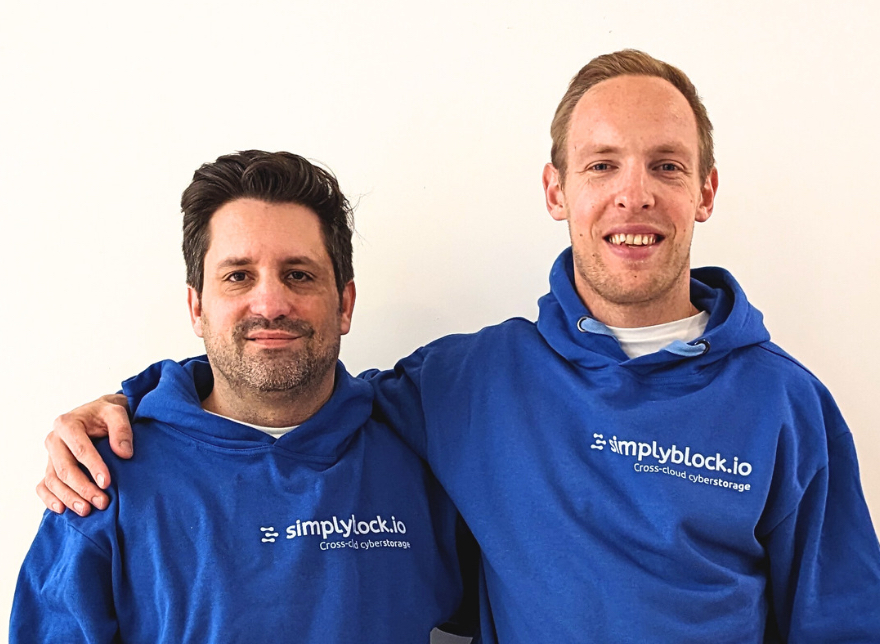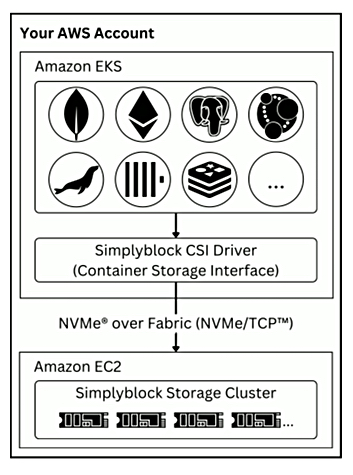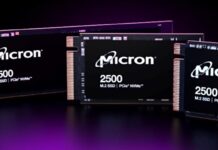German startup Simplyblock has won seed funding for its fast cloud-native block storage software and aims to build on it to develop AI-powered storage tiering.
Two founders, CEO Robert Pankow and CTO Michael Schmidt, started up Simplyblock in Berlin in 2022. Two years later they have produced a basic software product and gained $2.75 million seed funding. Their software, running in containers and using low-level Linux features, can be located on-premises or in the AWS cloud, and the public cloud is the main focus. In either location it uses NVMe SSDs but, in the public cloud, it uses ephemeral storage instances as these are the fastest NVMe devices available.

Michael Schmidt issued a statement saying: “As a CIO, I started to question the cost/performance ratio of enterprise storage systems in the light of the latest generation of storage hardware such as ultra-fast NVMe SSDs. It turned out that enterprise data storage is quite an inert industry.”
“And later on it became evident that fast cloud storage has at least the same potential for innovation and optimization. That is how we came up with an alternative, which is more flexible and better scalable, has better performance at much lower cost and reduced carbon emissions than today’s systems and services.”
This first release product provides millions of IOPS with sub-millisecond latency for applications running in AWS and using EKS. It provides a Kubernetes storage class based on scale-out clustered storage with a proprietary storage engine using VASH (Virtual Autonomous Storage Hyperscaler) technology. This balances and optimizes provisioned volumes across the storage cluster.
The software is optimized for AWS NVMe (io1/2) and gp3 volumes. The feature list is extensive. It provides copy-on-write block storage with thin-provisioning, instant snapshots, sync/async replication, async compression, inline and cluster-wide deduplication, multipathing, encryption, and near caching. Users can add, remove, or replace AWS volumes at any time, with autonomous re-balancing of the storage and load across all available resources.

It is claimed to be up to 10x cheaper per GB and per IOPS than similarly performing Amazon EBS storage. Simplyblock says it can provide up to 100,000 IOPS/TB and scale out past, wait for it, 100 million IOPS using thousands of SSDs. It claims there is no conventional SAN system available that scales similarly. Well, yes, it’s right in that score.
Simplyblock is targeting AWS-base database users of any kind (SQL, NoSQL, Vector or Graph) as first customers for its initial product. It is already available to early-access customers. The company will add support for Azure and GCPin the future.
In so far as ephemeral storage instances are used, Simplyblock parallels Dell APEX Block Storage for AWS, Lightbits, Volumez and Silk. As far as on-premises storage is concerned it’s just another NVMe all-flash storage startup. With these thoughts in mind we asked Robert Pankow some questions about the product:
B&F: How does Simplyblock running on-premises compare to an all-NVMe SSD block storage provider, such as Pure Storage or NetApp?
Robert Pankow: We are NVMe-oF (NVMe/TCP) based solution and we can run on commodity hardware. There is no dependency from the hardware or kernel upgrades to run our solution on-prem. We do not inject proprietary drivers into the data path and we are software-solution only. We do not sell hardware. Having said that, on-prem is not our focus area at the moment. We focus on AWS deployments currently and on other public clouds in the near future.
B&F: How does Simplyblock running in AWS compare to Volumez? Does it, like Volumez, use ephemeral storage instances?
Robert Pankow: Yes, we use ephemeral EC2 instances to run on AWS. However we can also use EBS (gp3) volumes to do that. We are distributed, erasure coded system which yields benefits in terms of performance and cost even if we use EBS in the backend.
Volumez would be probably the closest technology to ours. However, as far as I know, their architecture is not distributed (i.e. erasure coded by default) so we can offer more benefits to the end user – not just on the cost of performance (cost/IOPS) but also on the cost of capacity (cost/TB), removing the need for 3x replicas. We’re going for much broader market than Volumez. We also plan to build intelligent AI-powered tiering into the storage, eventually becoming a single storage layer for all storage requirements.
B&F: Several NVMe SSD startups have tried to become standalone companies before, such as E8 and Excelero. Why is Simplyblock different?
Robert Pankow: Indeed, some startups failed to become standalone company but this is nature of startups in many fields; not just in storage. There are two key differences between [the] above-mentioned companies and us:
1. We are build on and for public clouds while the mentioned solutions completely missed the market momentum (shift to the cloud). We are the first solution that has been natively built on AWS.
2. We will be go for much broader storage market than just high-performance use-cases with our unique architecture and intelligent AI-powered storage tiering. The high-performance segment is very narrow – you need to be a dominant player to make it work. In some way [it] will bring the benefits of the traditional SAN system into the public cloud.
The funding round will allow Simplyblock to expand its engineering team and take the product to general availability later in the year. Find out more information from Simplyblock’s resource center.
Bootnote
The seed funding round was led by pan-European seed stage VC 42CAP, alongside European early-stage investor Antler, and London-based international VC Begin Capital. Angel investors include Johan Svensson, the founder of graph database company Neo4j.
There are ten Simplyblock employees, including engineers who have worked for companies such as NVIDIA, Mellanox, NetApp, Dell EMC, Instana and Timescale.







